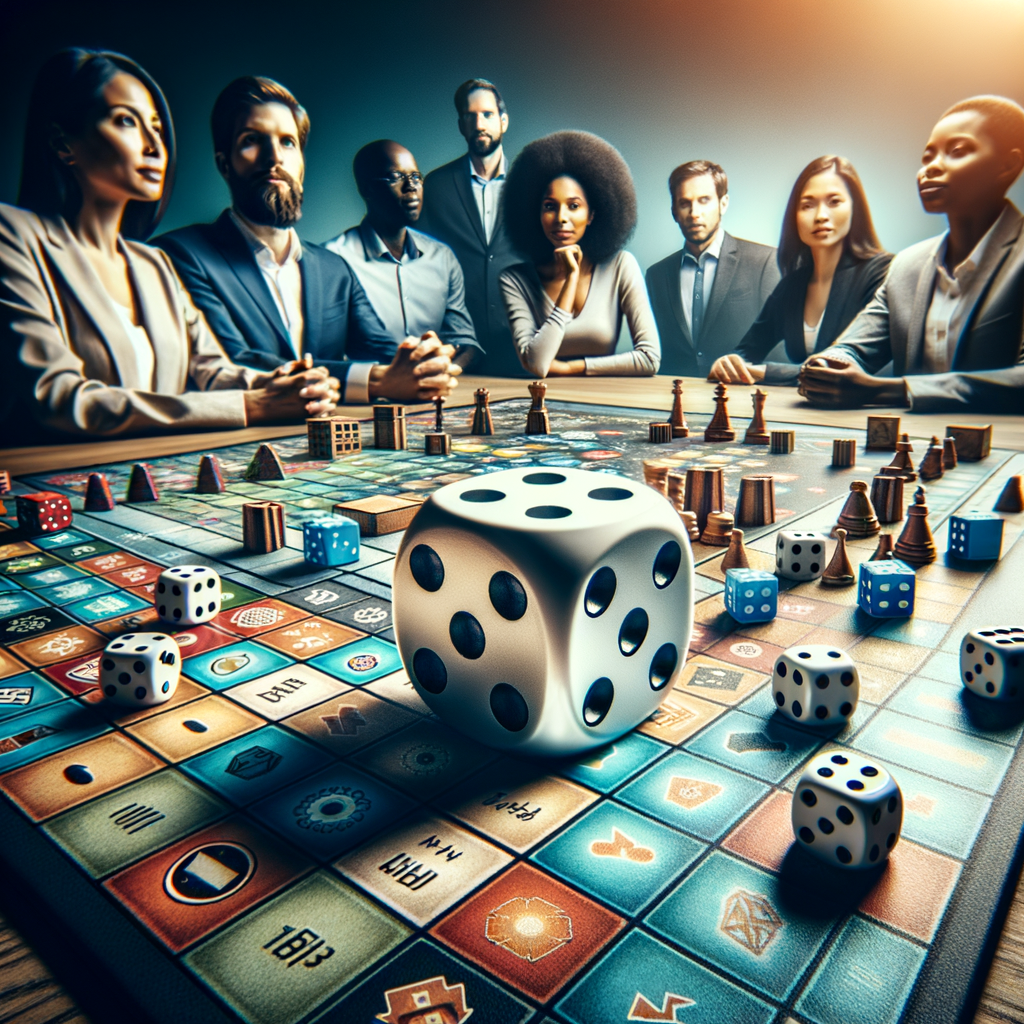Introduction to Board Games and Dice
Board games and dice have been a source of entertainment for centuries. They bring people together, stimulate strategic thinking, and offer a fun way to pass the time. This article will provide an overview of board games and the role of dice in these games.
- Overview of Board Games
Board games are tabletop games that typically involve counters or pieces moved or placed on a pre-marked surface or “board”, according to a set of rules. They can be based on pure strategy, chance, or a mixture of the two, and usually have a goal that players try to achieve before their opponents do. Some of the most popular board games include Monopoly, Chess, and Scrabble.
- Role of Dice in Games
Dice are often used in board games to introduce an element of chance. They can determine the number of steps a player moves, the outcome of an encounter, or the resources a player gains. Dice can be as simple as a single six-sided die or as complex as multiple dice with different numbers of sides, as seen in games like Dungeons & Dragons. The use of dice adds an unpredictable aspect to games, making them more exciting and dynamic.
In the following sections, we will delve deeper into the mechanics of dice in board games, the balance between chance and skill, strategies for board games, and the application of game theory to dice. Stay tuned to learn more about the fascinating world of board games and dice!
Understanding the Mechanics of Dice in Board Games
Dice play a crucial role in many board games. They introduce an element of chance, which can make games more exciting and unpredictable. But how exactly do they influence the outcomes of these games? Let’s delve into the mechanics of dice in board games.
How Dice Influence Game Outcomes
Dice can influence game outcomes in two main ways: through chance and skill. Let’s explore these aspects.
- Chance in Board Games
Chance is an integral part of many board games. When you roll a die, the outcome is unpredictable. This randomness can make games more exciting, as it keeps players on their toes. For instance, in the game of Monopoly, the roll of the dice determines how many spaces a player moves, which can significantly impact the game’s outcome.
- Skill in Board Games
While dice introduce an element of chance, skill also plays a significant role in many board games. For example, in the game of Yahtzee, players must decide which dice to keep and which to re-roll, requiring strategic decision-making. Therefore, while the roll of the dice is random, players can use their skills to influence the game’s outcome.
In conclusion, dice add an element of unpredictability to board games, making them more exciting and engaging. Whether it’s through chance or skill, the roll of the dice can significantly influence the outcome of a game.
Types of Dice Games
Dice games have been a part of human culture for thousands of years, providing entertainment and a chance to test one’s luck and strategic skills. They come in various forms and styles, each with its unique set of rules and gameplay. Let’s explore two broad categories of dice games: Classic and Modern.
Classic Dice Games
Classic dice games have stood the test of time and continue to be enjoyed by players of all ages. These games often have simple rules, making them easy to learn and play. Here are a few examples:
- Craps: Originating from an old English game, Craps is now a popular casino game. The aim is to bet on the outcome of the roll of two dice. Learn more about Craps.
- Yahtzee: This game involves rolling five dice to make certain combinations, similar to poker hands. The player with the highest total score at the end wins. Learn more about Yahtzee.
- Backgammon: One of the oldest known board games, Backgammon uses dice to determine the movement of pieces. The goal is to remove all your pieces from the board before your opponent. Learn more about Backgammon.
Modern Dice Games
Modern dice games incorporate innovative rules and often blend elements from classic games, creating a fresh and exciting gaming experience. Here are some examples:
- King of Tokyo: In this game, players take on the role of monsters vying for control of Tokyo. Dice rolls determine the actions available to players. Learn more about King of Tokyo.
- Zombie Dice: This quick-paced game involves rolling dice to gather brains while avoiding shotgun blasts. The player who collects the most brains wins. Learn more about Zombie Dice.
- Dice Forge: In this strategic game, players roll dice to gather resources and upgrade their dice throughout the game. The player with the most victory points at the end wins. Learn more about Dice Forge.
Whether you prefer the simplicity of classic games or the innovative mechanics of modern ones, there’s a dice game out there for everyone. So, why not roll the dice and give one a try?
Chance versus Skill in Games
When it comes to board games, the balance between chance and skill can significantly impact the outcome. Dice, in particular, play a crucial role in determining game outcomes. Let’s delve into this fascinating topic.
Importance of Dice in Determining Game Outcomes
Dice are a common feature in many board games, and they add an element of unpredictability that can make games more exciting. However, they also introduce a degree of chance that can sometimes overshadow skill.
- How Dice Add an Element of Uncertainty
Dice are random number generators. When you roll a die, the outcome is entirely unpredictable. This randomness can make games thrilling, as it adds an element of surprise. For example, in a game like Monopoly, a roll of the dice determines how many spaces a player can move, which can lead to unexpected twists and turns. This unpredictability is what makes dice games so engaging and fun to play.
- Strategies to Mitigate the Role of Chance
While dice add an element of chance, players can employ strategies to mitigate this randomness and increase their chances of winning. For instance, in a game like Risk, players can strategically place their armies to maximize their chances of success, regardless of the dice roll outcome. Similarly, in a game like Yahtzee, players can decide which dice to reroll to optimize their score. Thus, even in games where dice play a significant role, skillful strategy can still tip the scales in a player’s favor.
In conclusion, while dice introduce an element of chance into board games, they also add a layer of excitement and unpredictability. Moreover, skillful strategy can often mitigate the role of chance, resulting in a game that is both fun and challenging.
Board Games Where Skill Predominates
While many board games involve a mix of luck and strategy, there are some where skill is the primary factor for winning. Let’s explore two of the most popular skill-dominant board games: Chess and Go.
- Chess
Chess is a classic game of strategy and skill that has been played for centuries. It’s a two-player game where each player starts with 16 pieces: one king, one queen, two rooks, two knights, two bishops, and eight pawns. The goal is to checkmate your opponent’s king. This means the king is in a position to be captured (in “check”) and there is no way to move the king out of capture (mate).
Chess requires strategic planning and foresight. Players must think several moves ahead, anticipating their opponent’s moves and planning their own. It’s a game where every move counts, and even a single mistake can cost you the game. Learn more about Chess here.
- Go
Go is another ancient board game that requires a high level of skill. Originating in China over 2,500 years ago, Go is a game of territory. Two players take turns placing stones on the board, with the goal of surrounding more territory than their opponent.
Go is a game of strategy and balance. Players must carefully consider each move, balancing the need to expand their own territory while preventing their opponent from doing the same. It’s a game that requires patience, strategic thinking, and the ability to adapt to changing situations. Learn more about Go here.
Both Chess and Go are excellent examples of board games where skill predominates. They require strategic thinking, planning, and the ability to adapt to changing situations. While they may be challenging to master, they offer a rewarding and engaging experience for those willing to put in the effort to learn.
Board Games Strategy
When it comes to board games, having a solid strategy is key to success. This is especially true in dice games, where the roll of the dice can determine the outcome. Let’s delve into some strategic approaches to dice games.
How to Strategize in Dice Games
There are two main factors to consider when strategizing in dice games: understanding probability and planning ahead. Let’s take a closer look at each.
- Understanding Probability
Probability is the likelihood of a particular outcome. In dice games, it’s about understanding how likely you are to roll a certain number. For example, in a game using a six-sided die, each number has a 1 in 6 chance of being rolled. Knowing these odds can help you make strategic decisions. For more on probability, check out this Wikipedia article.
- Planning Ahead
Planning ahead involves thinking about your future moves and how your current move will affect them. In dice games, this could mean deciding whether to take a risk now for a potential reward later, or playing it safe to ensure you stay in the game. Remember, every decision you make can impact your future moves, so plan wisely!
By understanding probability and planning ahead, you can develop a winning strategy for any dice game. Remember, the key to success in board games is not just luck, but also strategy. So, roll the dice, and may the odds be ever in your favor!
Case Studies: Strategy in Action
Let’s delve into some real-life examples to better understand how strategy can be effectively applied in dice-based board games. Here are two case studies that highlight the importance of understanding probability and planning ahead.
Case Study 1: The Monopoly Master
Meet John, a 12-year-old who loves playing Monopoly. John quickly realized that the game wasn’t just about luck, but also about strategy. He started studying the probability of landing on certain squares and used this knowledge to make informed decisions about property purchases.
For instance, he found out that the chances of landing on Illinois Avenue were higher than any other spot on the board. So, he always tried to buy it when he had the chance. His strategy paid off, and he won most of the games he played. This case study shows how understanding probability can significantly improve your game strategy. You can read more about Monopoly strategies on Wikipedia.
Case Study 2: The Yahtzee Champion
Next, let’s look at Sarah, a 10-year-old Yahtzee enthusiast. Sarah understood that planning ahead was crucial in Yahtzee. She always kept track of which categories she had already scored in and which ones were left. This helped her decide which dice to keep and which ones to reroll.
For example, if she had already scored in the ‘Three of a Kind’ category, she would not aim for it again, even if her dice roll suggested otherwise. Instead, she would aim for a category she hadn’t scored in yet. Her strategic approach helped her win many games against her friends. This case study highlights the importance of planning ahead in dice games. Learn more about Yahtzee strategies on Wikipedia.
These case studies demonstrate that a good strategy can make a significant difference in dice-based board games. By understanding probability and planning ahead, you can increase your chances of winning.
Dice and Game Theory
Game theory is a fascinating field that combines mathematics, psychology, and strategy. It’s often used in economics, politics, and even in our favorite board games. In this section, we’ll explore how game theory applies to dice games.
Applying Game Theory to Dice Games
When we play dice games, we’re not just rolling the dice and hoping for the best. We’re actually engaging in a complex process of decision-making and strategy. This is where game theory comes in.
- Basic Concepts of Game Theory
Game theory is all about making the best decisions based on the information you have. It’s a way of predicting what others will do and adjusting your strategy accordingly. The key concepts in game theory include players, strategies, and payoffs. Players are the people participating in the game. Strategies are the choices each player can make. And payoffs are the outcomes that result from the combination of these choices.
- Game Theory in Dice Games
In dice games, game theory comes into play when we decide whether to roll the dice again or stick with our current score. We have to consider the probability of getting a higher score if we roll again, versus the risk of getting a lower score. This decision-making process is a perfect example of game theory in action.
Understanding game theory can help us make smarter decisions in dice games and increase our chances of winning. So next time you play a dice game, remember: it’s not just about luck. It’s also about strategy and making the best decisions based on the information you have.
Examples of Game Theory in Popular Board Games
Game theory is not just a concept for economists and mathematicians. It’s also a key element in some of our favorite board games. Let’s explore how game theory plays out in two popular board games: Monopoly and Settlers of Catan.
Monopoly
Monopoly, a classic board game loved by many, is a perfect example of game theory in action. In Monopoly, players buy, trade, and develop properties to accumulate wealth. The strategic decisions made by players, such as when to buy or trade properties, are influenced by the actions of other players. This is a classic example of game theory, where players must anticipate the actions of others to maximize their own benefits. For instance, a player might decide to buy a property not because they need it, but to prevent another player from owning all properties of the same color and building houses or hotels. (source)
Settlers of Catan
Settlers of Catan is another popular board game that showcases game theory. In this game, players build settlements, cities, and roads to earn points and resources. The game involves a lot of strategic decision-making and negotiation with other players. For example, a player might choose to build a road not just to expand their own settlement, but also to block another player’s expansion. Similarly, players often trade resources with each other, and the decision of what to trade and with whom is heavily influenced by the actions of other players. This constant interaction and strategic decision-making is a clear demonstration of game theory. (source)
In conclusion, game theory is a fascinating concept that is not just confined to academic textbooks. It’s a part of our everyday lives, influencing our decisions in ways we might not even realize. And as we’ve seen, it’s also a key element in some of our favorite board games, adding an extra layer of strategy and excitement to the gameplay.
Conclusion: The Enduring Role of Dice in Board Games
In this article, we have explored the fascinating world of board games and the pivotal role that dice play in them. Let’s recap our key points and look towards the future of board games.
- Recap of Key Points
We started our journey by introducing the concept of board games and dice, highlighting the importance of dice as a tool for introducing chance and randomness into games. We delved into the mechanics of dice in board games, explaining how they contribute to the unpredictability and excitement of the game. We also explored the balance between chance and skill in games, and how dice can tip this balance.
We discussed strategies in board games and how understanding the probabilities associated with dice rolls can enhance a player’s strategy. We also touched on game theory and how it applies to dice-based games. Through all these discussions, it’s clear that dice have an enduring and significant role in board games.
- Future Trends in Board Games
Looking ahead, we can expect to see dice continuing to play a key role in board games. However, we may also see innovative uses of dice, such as digital dice or dice with customizable faces. The rise of hybrid games, which combine traditional board game elements with digital technology, may also lead to new ways of incorporating dice into gameplay.
Furthermore, the trend towards more complex and strategic board games may lead to new types of dice mechanics, such as dice drafting or dice manipulation. Regardless of these changes, the fundamental role of dice in introducing chance and randomness into games is likely to remain unchanged.
In conclusion, dice have played a crucial role in board games for thousands of years, and they will continue to do so in the future. As we look ahead, we can expect to see new and innovative uses of dice in board games, but the enduring appeal of rolling the dice and leaving some things to chance will always be a part of the board game experience.




